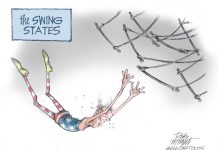It seems like yesterday, but Sept. 15, 2018 marked the 10-year anniversary of the bankruptcy of Wall Street investment banking colossus Lehman Brothers, a seminal event that sent U.S. stocks crashing by 43 percent to the March 9, 2009 bear market low.
While the housing/subprime mortgage bubble had been inflating since 2004 and the resulting global financial crisis had been raging since 2007, the Federal Reserve and U.S. Treasury doing the previously unthinkable and allowing a big, "systemically important" financial institution (i.e. those that could take the whole financial system down with them) to fail unleashed a panic that threatened a repeat of the Great Depression.
For businesses, credit is like the air we breathe. When credit is cheap and abundant, you hardly think about it. When credit is expensive or scarce, it’s all you think about. Credit is based on trust and confidence. I will loan you money for a day or 30 years if I trust you and am confident in your ability to pay me interest when it is due and the principal at maturity.
The magnitude and velocity of the collapse of financial markets and institutions that reached a crescendo with Lehman’s bankruptcy created a poisoned atmosphere of mistrust leading to a contagion that spread like wildfire. No bank can survive if enough of its depositors/creditors become skittish and demand to be repaid at the same time, whether it was Lehman or the Bailey Bros. Building & Loan.
According to hedge fund titan Ray Dalio of Bridgewater in the excellent, recently published "A Template For Understanding Big Debt Crises" (free PDF download at https://www.principles.com/big-debt-crises/), credit has historically runs in cycles or logically-driven series of events that recur in patterns, typically ending in debt crises. Success leads to hubris, which breeds excess. When the music eventually stops, risky bets fail and it’s time to pay the piper.
Future debt crises may be inevitable, but who pays the piper could mitigate the damage.
So says a new paper by Dean Corbae (University of Wisconsin) and Ross Levine (University of California) presented at this year’s Jackson Hole Economic Symposium, "Competition, Stability and Efficiency in Financial Markets" https://www.kansascityfed.org/~/media/files/publicat/sympos/2018/jh080818revised.pdf?la=en, which suggests banks operate more like partnerships, with senior executives having "material skin-in-the game, so that those determining bank risk have a significant proportion of their personal wealth exposed to those risks."
In 1844, Henry Lehman emigrated from Germany to Montgomery, AL, where he opened a small shop selling goods to local cotton farmers. Brothers Emanuel and Mayer joined him and Lehman Brothers was born in 1850. The firm evolved from selling merchandise to trading cotton and eventually became an iconic financial titan.
Lehman Brothers, like all Wall Street banks (including Merrill Lynch, Morgan Stanley, Salomon Brothers, et al.), was structured as a partnership, with each partner having unlimited personal liability should the firm blow-up. Partners contributed capital to the firm, but not only was that amount at risk, but also their homes, cars and every asset they owned. Thus, partners were not only keenly focused on the risks they were taking, but also the risks each of their partners was taking.
In other words, they had all of their skin-in-the game. We invest alongside our clients and I can attest when you have all your eggs in one basket, you tend to watch that basket very closely.
In 1999, Goldman Sachs became the last of the major Wall Street investment banks to switch from being a partnership to a corporation, primarily because they needed access to more capital to compete with publicly-owned commercial banks and partners wanted their capital to be "liquid."
This inserted a new layer of non-management owners and eliminated the unlimited personal liability of partners. Worse, it introduced what economists call "perverse incentive," whereby managers are encouraged to take big risks because they can earn huge bonuses if the risk works out. Unfortunately, when you’re gambling with "OPM" (i.e. other people’s money), it’s the ultimate "heads I win, tails you lose" proposition, with shareholders left holding the bag if the action bombs.
The Federal Reserve Bank of New York stated "misaligned incentives contributed greatly to the financial crisis" and suggested it would be healthy to return some of the unlimited personal liability feature of partnerships by compelling managers to invest "cultural capital" into banks via deferring a significant amount of their compensation, which would be first in line to absorb losses from soured bets or regulatory fines.
Mickey Kim is the chief operating officer and chief compliance officer for Columbus-based investment adviser Kirr Marbach & Co. Kim also writes for the Indianapolis Business Journal. He can be reached at 812-376-9444 or [email protected].




